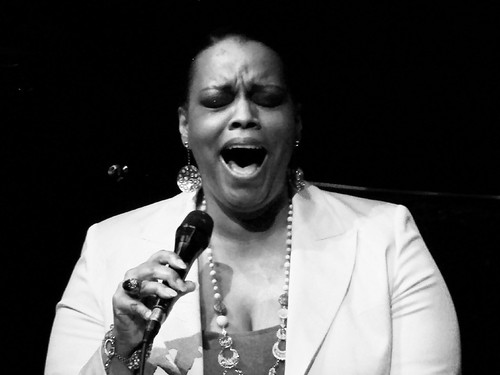 Ken-
Ken-Thanks for the recommendations you gave me Friday evening at Border's Books and Music. I copped alto saxophonist and composer Oliver Nelson's 1964 big band date “Fantabulous”. The album was 50%, a bargain. I wonder if the executives at Border’s know what jewels they’ve literally giving away. I also I copped “Out of the Cool” by Gil Evans. You said I should add that album to my collection. I’ve only listened to the album twice, but I plan to spend more time with it soon.
Evans was, indeed, an imposing composer. I have to be in a sure certain frame of mind to comprehend the many nuances in his arrangements. He wasn’t a chump by no means, which explains why Miles Davis adored him. I’m not implying Nelson’s arrangements were easy. He was more swing oriented.
“Fantabulous” was an easy read. It grabbed my attention faster than Evans’ album. Evans was sort of a jazz intellectual. He wanted his listeners to think. That’s fine because some music enthusiasts want the music they buy to challenge them. Nelson on the other hand, wanted his listeners to have a ball. I had a grand time with Nelson’s recording. I have “Fantabulous” on right now, in fact. Nelson’s gang just finished running through “Hobo Flats”.
Now flutist Kenny Soderblom is in the middle of his solo on “Post No Bills”. Nelson just segued in. His tone and the way he shuffled through the changes makes me think about alto saxophonists Charlie Parker and Sonny Criss. They probably were his chief influences.
Ken, “Fantabulous” was the first big band date I ever had a dream about. I never dream about music. In my dream, Nelson’s orchestra played in my backyard, and my neighbors gathered. I sat near the orchestra in a lotus position. The music made me sway back and forth, as if I was in a tennis match.
On the ballad “Take Me with You,” some of my neighbors slow dragged. Even the squirrels that inhabit antic enjoyed the music. They twirled as the band wailed on “Daylies’s Double”. During the first chorus, one of the squirrels yelled: “That’s my Jam”! I haven’t enlisted an exterminator to rid my antic of the critters. They have good taste in music. It was a surreal dream. I wanted it to go on an on.
I’m glad we met. Right away, I knew you’re a serious jazz enthusiast. When I saw you with all the albums tucked under your arm, I thought you'd need a grocery cart to haul all your fines to the cash register. We talked nearly an hour. Nowadays, I rarely meet fellow jazz mavens. I used to encounter them often. People download music now, and record stores suffer.
Mom and Pop record stores are atop the endangered species list. Unfortunately, the next generations of music enthusiasts won’t know record stores ever existed, and how important those stores were.
I recall when I could go to a neighborhood record store and chat for hours with some kindred stranger who was passionate about jazz as well. I would leave the record stores feeling as if I had spent hours in church listening to an uplifting sermon. Ken that’s how I felt after talking with you.
I can’t recall the last time I conversed about jazz with a stranger. Driving home, I told my wife about you. She asked if we exchanged telephone numbers. I wish I had. I’m confident we’ll meet again. Did you enjoy the Lee Morgan and John Coltrane dates I recommended? When you listened to Morgan’s album keep, your eyes opened for baritone saxophonist Pepper Adam’s solos. I guarantee they will floor you. If either album leaves you unsatisfied, I’ll reimburse you.
How many of the albums you purchased that evening have you listened to? I bet you don’t have any regrets. Ken, I appreciate your recommendations “Fantabulous” and “Out of the Cool. Maybe before Border’s liquidate their entire stock of jazz albums, we will meet again.
Continue to swing
Charles



.jpg)